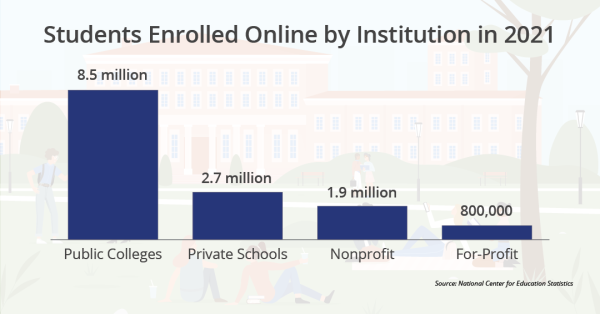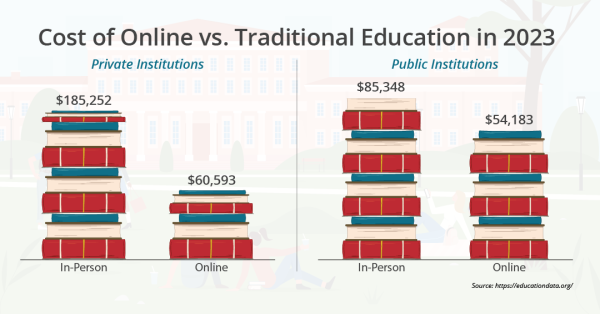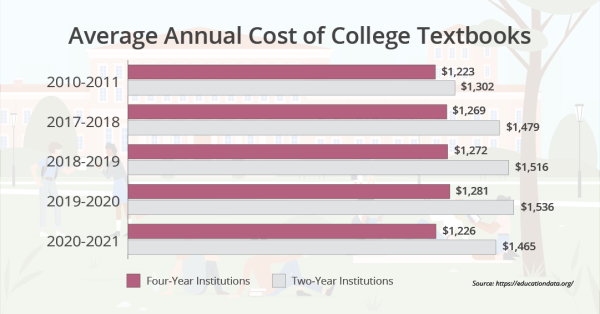
Enter the Virtual World of Online College Courses to Save Money While Reaching Your Education Goals
Earning an education at a college or university may be one of the best milestones you’ll ever hit. However, a college education comes with quite a price tag. You may consider enrolling in online courses if you want to save money.
Weighing your education options? Think about the benefits of online college courses over traditional on-campus classes.
Online vs. Traditional Classes
Online and traditional college courses are quite different. Do you want to be in a physical classroom setting or strictly through the Internet? Each format offers its benefits and challenges.
Online Courses
The courses you complete are all online via the Internet. Much like a traditional classroom, you’ll have the same learning materials but in a different presentation. You’ll submit your homework and projects through an online web portal and mainly communicate with your teachers or professors through email. You may have classes that require you to contribute to online discussion forums to show participation.
Online courses use a learning management system such as Blackboard, which allows you to see content, submit assignments, and communicate with classmates or professors. It shows your grades and allows you access a calendar to meet deadlines.
Some of the benefits of taking online courses include:
- Convenience: You can complete your work from anywhere and at a time that works for you if you meet your assignment and exam deadlines.
- Accessibility: Online courses can be easily accessed by anyone. Online courses are another option if someone cannot attend in-person classes. Sometimes these courses may be available to everyone around the world.
- Flexibility: You can work at your own pace on your coursework and have the option to work ahead. It also allows you to continue your other responsibilities including your job and childcare.
- Cost-effective: Online courses may decrease some costs associated with traditional classes. Tuition may be less expensive, and you’ll avoid costs such as transportation, room and board fees, and high materials prices.
Traditional Courses
You take traditional courses in person, in a physical classroom on a college campus with a teacher or professor. They teach through presentations and discussions during the allotted class time.
Some of the benefits of traditional courses include:
- Interaction: You can interact with your professors and classmates, participate in discussions, and ask questions.
- Campus life: You can access campus resources such as events or visits to the on-campus library.
- Focus: Many students prefer learning in a traditional classroom. The instructor is available to answer questions, making the learning experience easier.
- Networking opportunities: You can form connections with classmates and instructors. Meeting in person can help you find jobs or internships related to your field.
While online and traditional classes have their benefits, they do have some differences. Though online courses allow you to work ahead at your own pace, traditional courses require you to follow a schedule the professor sets with no opportunities to work ahead. Some other differences include:
- Cost
- Proficiency with technology
- Access to professors and classmates
- Self-motivation and discipline
A New Way of Learning
If you’re considering online courses to pursue a degree or just to continue your education, there are many reasons why this option may be the best for your needs. Let’s take a more in-depth look at why online learning may be better than sitting in a traditional classroom.
Variety of courses
Online courses have become more popular, especially during the pandemic. However, remote learning has grown over the years as technology has improved.
Online platforms such as Coursera opened the doors for students to enroll in distance learning. By 2019, 36% of college and university students signed up for at least one online course, about half attended exclusively online, according to a National Center for Education Statistics report. By 2021, that percentage increased to 61%. In 2016, Coursera had 21 million users, according to the World Economic Forum. By 2022, 92 million users have used the online learning platform.
Some colleges and universities may offer a broader range of online education options. You can earn several different professional degrees depending on what you want to study. These may include:
- Associate degree
- Bachelor’s degree
- Master’s degree
- Doctoral degree
- Law degree
These degrees can range anywhere from one to seven years to complete, depending on the level of study and discipline. For instance, if you aim to earn your doctoral degree, it can take four to seven years to finish.
The NCES reports that during the 2020-21 academic year, online colleges or universities had:
- 45,703 associate degrees
- 134,088 bachelor’s degrees
- 100,023 master’s degrees
- 6,734 doctorates
Before you decide what level of education and field of study to pursue, do your research to find the best college or university that offers the courses you need. If you’re not seeking for a full degree, other options include certificate programs to boost your skills. Some programs include financial planning, copyediting, and more. These take anywhere from five to seven months to complete. You may take an independent course without enrolling in a full degree program.

Convenient Location and Flexibility
Online learning allows you to access your classes from anywhere. These classes fall into one of two delivery categories: synchronous and asynchronous.
In synchronous courses, the students attend in groups at a specified time. Professors or instructors deliver live lectures while requiring student discussions. This type of delivery creates a more social atmosphere to build connections and help with learning. Communication also isn’t delayed in this setting. Students can ask questions and participate in real time. However, because the classes are set at a specific time, it makes it more difficult to attend. Learners with accessibility needs or those with technical difficulties such as Internet connection can hinder completing coursework or attending class on time.
On the other hand, asynchronous learning allows students to read assignments and watch recorded lectures to complete them on their own time. There is more time to think about the coursework. Though there may be deadlines, students can access course materials without dealing with scheduling conflicts. However, these self-paced courses require strong time-management skills and self-motivation without guidance from teaching staff. There is also less class discussion and real-time connection. If you’re looking for a more structured routine, asynchronous learning may not suit your needs.
Online learning can also help decrease any stress – personal or logistical. Some colleges and universities may offer options that allow you to take courses immediately, but they may also provide the traditional 16-week or eight-week classes much like traditional settings.
Taking online classes saves you money on your commute, parking fees, bus fare, ride sharing, auto maintenance and fuel spending. According to the State University of New York system report, transportation for commuters costs $1,720 for the 2023-2024 school year for the bachelor’s degree program, while it costs $1,820 for community college associate degree programs. Along with no commute, you won’t have to worry about relocating to take classes. The classroom comes to you.
Room and Board Fees and Tuition
Taking online classes gives you a cost advantage. Online learners may pay the same or lower tuition rates as on-campus students, but they won’t worry about on-campus housing or meal plans. However, online students may be responsible for groceries, Internet, electricity and heat, and an apartment rental or mortgage.
Students pay $600 more for a campus meal plan than made-at-home meals for the year, according to an Education Data Initiative report.
As for tuition, the EDI report also states an online degree is $31,165 cheaper than an in-person degree from a public four-year college or university. The online degree costs about $54,183 versus $85,348 for an in-person degree.

Cost of Supplies and Materials
The cost of textbooks may add to your college education’s expenses. With taking online classes, students may not have to worry about purchasing physical books. Digital textbooks may be a fraction of the price. When taking online classes, instructors or professors may supply the digital course materials for the semester. Students can access materials from any device, including laptops and smartphones. The material can be reviewed in one location anytime and anywhere if there is an Internet connection.

Start Saving for Classes
If you're ready to save for college, Adirondack Bank is here to help! We understand how significant your savings are to your financial future. That's why we offer a variety of accounts for all ages and stages of life. We can help you find the savings account that fits you best.
Check out our savings account comparison to choose the best account for you.
When you're ready to open an account, visit your nearest branch for complete details. Our dedicated staff will help you choose the right product!
The information in this article was obtained from various sources not associated with Adirondack Bank. While we believe it to be reliable and accurate, we do not warrant the accuracy or reliability of the information. Adirondack Bank is not responsible for, and does not endorse or approve, either implicitly or explicitly, the information provided or the content of any third-party sites that might be hyperlinked from this page. The information is not intended to replace manuals, instructions or information provided by a manufacturer or the advice of a qualified professional, or to affect coverage under any applicable insurance policy. These suggestions are not a complete list of every loss control measure. Adirondack Bank makes no guarantees of results from use of this information.

